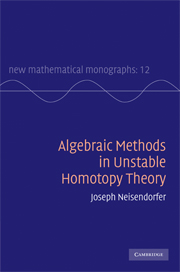Book contents
- Frontmatter
- Contents
- Preface
- Acknowledgments
- Introduction to unstable homotopy theory
- 1 Homotopy groups with coefficients
- 2 A general theory of localization
- 3 Fibre extensions of squares and the Peterson–Stein formula
- 4 Hilton–Hopf invariants and the EHP sequence
- 5 James–Hopf invariants and Toda–Hopf invariants
- 6 Samelson products
- 7 Bockstein spectral sequences
- 8 Lie algebras and universal enveloping algebras
- 9 Applications of graded Lie algebras
- 10 Differential homological algebra
- 11 Odd primary exponent theorems
- 12 Differential homological algebra of classifying spaces
- Bibliography
- Index
11 - Odd primary exponent theorems
Published online by Cambridge University Press: 03 May 2010
- Frontmatter
- Contents
- Preface
- Acknowledgments
- Introduction to unstable homotopy theory
- 1 Homotopy groups with coefficients
- 2 A general theory of localization
- 3 Fibre extensions of squares and the Peterson–Stein formula
- 4 Hilton–Hopf invariants and the EHP sequence
- 5 James–Hopf invariants and Toda–Hopf invariants
- 6 Samelson products
- 7 Bockstein spectral sequences
- 8 Lie algebras and universal enveloping algebras
- 9 Applications of graded Lie algebras
- 10 Differential homological algebra
- 11 Odd primary exponent theorems
- 12 Differential homological algebra of classifying spaces
- Bibliography
- Index
Summary
In order to prove the odd primary exponent theorems for spheres and Moore spaces, we have to use techniques from most of the chapters of this book.
We have to use localization. The theorems are not true without localization.
We have to use homotopy groups with coefficients and the structure of Samelson products on these groups in order to construct the maps which will give product decomposition theorems for certain loop spaces.
We have to use the fibre extensions of cubes and squares in order to tie together in fibration sequences different product decompositions.
We have to use Bockstein spectral sequences to analyse the torsion in the homology and homotopy of these loop spaces.
We have to use exact sequences of free differential graded Lie algebras in order to construct tensor product decompositions of universal enveloping algebras. In fact, it might be said that the main result of this chapter is the geometric realization via an infinite weak product of just such a tensor product decomposition of the universal enveloping algebra of a free differential graded Lie algebra.
We have to use differential homological algebra, not so much in the form of the Eilenberg–Moore spectral sequence, but in the chain equivalences with differential Cotor which underlie the Eilenberg–Moore theory.
Surprisingly, the only chapters in this book which we do not use much of here are the chapters on the Hopf invariants of Hilton, James, and Toda.
- Type
- Chapter
- Information
- Algebraic Methods in Unstable Homotopy Theory , pp. 437 - 488Publisher: Cambridge University PressPrint publication year: 2010



